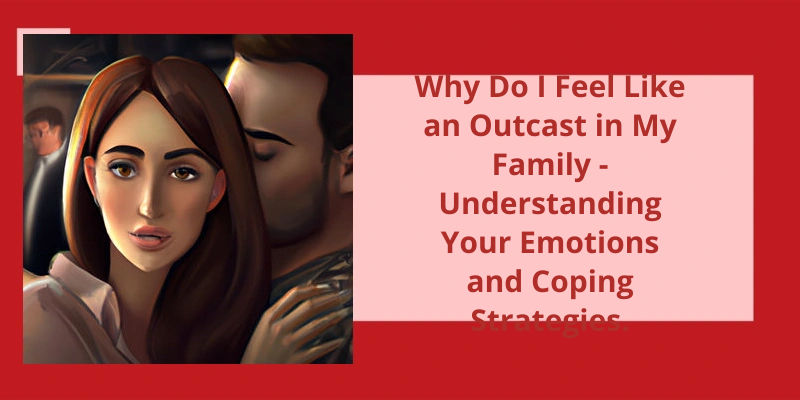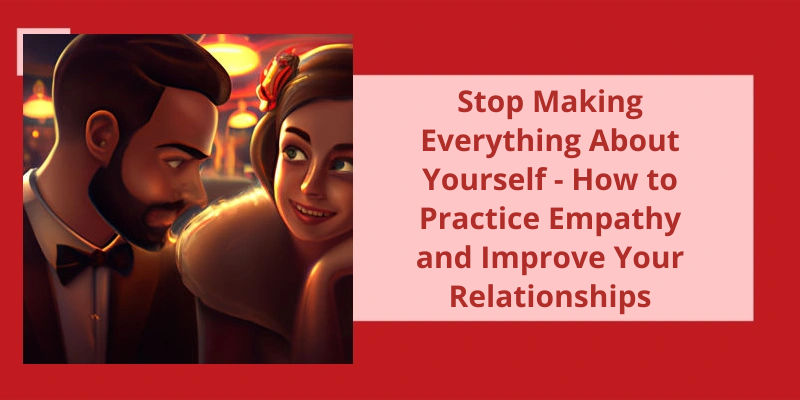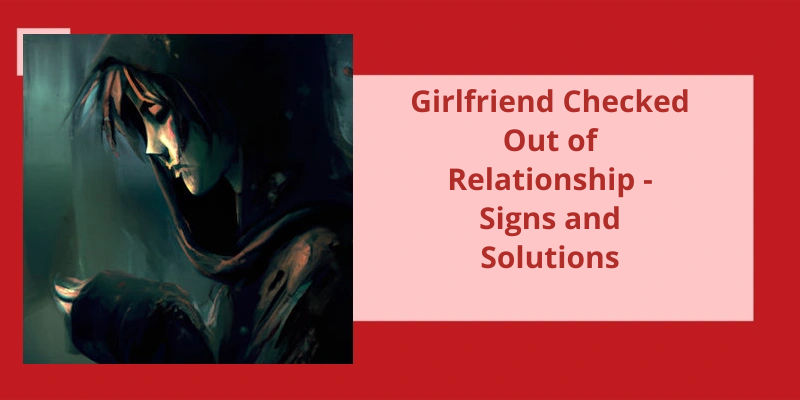As humans, we’ve an innate desire to belong and connect with others, especially with our family. However, sadly, it's not uncommon to feel like an outcast among our loved ones. It can be a painful and isolating experience, often leaving us questioning our worth and struggling to understand why we don't fit in. While there can be various reasons for feeling this way, one of the most prevalent factors is low self-esteem. When we don't value ourselves or believe in our abilities, we project this onto others, seeking validation and approval that never seems to come. This can result in a vicious cycle of feeling inadequate and rejected, leading us to withdraw and distance ourselves further. So why do we feel like outcasts in our family? Let's explore this complex and emotional topic further.
Is It Normal to Feel Out of Place in Your Family?
These may be friends, partners, or even colleagues who understand and respect us more than our immediate family members do. It isn’t uncommon to feel disconnected from our families, even when we share the same blood and upbringing.
Many factors can contribute to this sense of detachment and isolation from our families. For example, we may have different values, beliefs, or lifestyles that clash with those of our parents or siblings. We may have experienced trauma or abuse that’s affected our relationships with our family members. We may have grown apart due to geographical distance, career choices, or divergent interests.
Moreover, feeling out of place in our family can be a painful and confusing experience. We may feel guilty or ashamed for not fitting in or being accepted by our loved ones. We may wonder if were the problem or if theres something wrong with us. We may experience anxiety, depression, or low self-esteem as a result of this disconnection.
However, it’s important to remember that we’ve the power to create our own sense of belonging and identity regardless of our family situation. We can seek out supportive communities, therapy, or self-help resources to help us process and heal from our family wounds. We can also set boundaries and assert our needs with our family members, even if it feels uncomfortable or challenging.
Ultimately, feeling out of place in our family isn’t a reflection of our worth or value as human beings. It’s a natural and common experience that many of us go through in our journey towards self-discovery and growth. By acknowledging and accepting our feelings, we can begin to cultivate a sense of belonging and purpose that transcends our family of origin. We can build our own families based on mutual respect, understanding, and unconditional love.
The Impact of Divorce and Blended Families on a Sense of Belonging
This essay explores the consequences of divorce and blended families on an individual’s feeling of belonging in their family unit. It examines how each situation can impact an individual’s sense of identity and belonging within a family.
It’s not uncommon to feel like the black sheep in your family, especially if your loved ones have different values or expectations than you do. Some families may struggle with understanding and accepting differences, which can leave members feeling left out or misunderstood. In such cases, it can be helpful to explore why you’re feeling this way and how you can better communicate with your family to foster a deeper sense of understanding and validation.
Why Do I Feel Like the Black Sheep in My Family?
Additionally, being the black sheep in a family can be isolating. It can feel like no one relates to you or understands your experiences, leading to feelings of loneliness and disconnectedness. This can be especially challenging during family gatherings, where you may feel like an outsider or like you don’t belong.
It’s important to remember that feeling like the black sheep in your family doesn’t necessarily mean theres anything wrong with you. Everyone has different experiences and perspectives, and it’s possible that your family may not fully understand or appreciate yours. It’s okay to be different and to go against the norm, even if it’s uncomfortable or challenging.
If youre struggling with feeling like the black sheep in your family, it can be helpful to seek support from people outside of your family who understand and appreciate you for who you are. This could mean finding a therapist or counselor who can help you work through your feelings and develop coping strategies, or seeking out other communities or social groups where you feel more understood and accepted. Remember that you aren’t alone, and that there are people out there who’ll value and embrace you for who you are.
Dealing with family exclusion can be difficult and emotionally draining. It’s important to recognize and validate your feelings, as they’re real and valid. However, before taking any drastic actions, try talking to your family to understand if the exclusions are unintentional. If they persist, it’s essential to focus on your self-worth and spend time with other supportive individuals.
What to Do When Your Family Excludes You?
Being excluded from family gatherings or events can be an incredibly painful experience. It can leave you feeling helpless, isolated and even inadequate. Your hurt feelings are real and very much valid. However, instead of bottling up your feelings, it’s important to recognize them, talk about them and ultimately find ways to cope with them.
The first step towards dealing with exclusion from family is to acknowledge your feelings. Avoid dismissing them as insignificant and instead, take time to process and understand them. Whether it’s sadness, anger or disappointment, acknowledging your emotions can go a long way in helping you cope with this experience.
Often times, the exclusion may have been a result of a simple miscommunication or misunderstanding. Approach the conversation in a calm and objective manner. Try to explain how their actions have affected you and express your desire to be included in future family gatherings.
It’s important to remember that exclusion isn’t a reflection of your worth or value as a person. Instead of focusing on the negative emotions, try to focus on your strengths and what makes you unique. Cultivate your self-confidence and self-worth and don’t let the actions of others define you.
Turning to friends, colleagues or other support systems can help you find comfort and belonging. These individuals can provide a sense of community, validation and emotional support. It’s important to surround yourself with individuals who appreciate and value you for who you are.
However, it’s important to remember that you aren’t alone and there are ways to cope with these feelings. Recognize your feelings, talk to your family, focus on your worth, and spend time with people who value you. With time, you’ll find the strength to overcome this hurtful experience and come out stronger on the other side.
The feeling of being an outcast can be isolating and daunting, leaving one to feel detached from their surroundings and those around them. It’s a state of mind that can lead to feelings of inadequacy, low self-esteem, and a sense of alienation from society.
What Does It Mean to Feel Like an Outcast?
For those of us who’ve felt like an outcast, we know that it isn’t just about being alone. It’s about feeling like you just don’t fit in, no matter how hard you try. We often feel like we’re on the outside looking in, watching the world go by without ever being a part of it. It can be an incredibly lonely and painful experience.
Feeling like an outcast can have a lasting impact on our mental health. The constant rejection and isolation can lead to depression, anxiety, and low self-esteem. We may start to believe that we aren’t worthy of love and acceptance. This can make it difficult to form healthy relationships and can even impact our career choices.
There’s a sense of shame that often comes with feeling like an outcast. We may feel like we’re somehow flawed or broken. We may try to hide our true selves in an effort to fit in, but this only perpetuates the cycle of isolation and rejection. It becomes a vicious cycle that’s difficult to break.
Despite the pain of feeling like an outcast, there are lessons to be learned from the experience. We learn resilience and strength in the face of adversity. We learn to embrace our unique qualities and celebrate our differences. We learn to find our own sense of belonging, even if it isn’t with the mainstream crowd.
Ultimately, feeling like an outcast is a reminder that we’re all human, and we all struggle with feelings of insecurity and self-doubt at times. It’s a reminder that we need to be kind and compassionate to ourselves and others. We never know the struggles that someone else is facing, and a little kindness can go a long way in helping them feel accepted and supported.
However, there are strategies and tips that you can use that may help you develop better self-esteem and overcome your feelings of being an outsider. In the following sections, we’ll explore some practical strategies that you can use to start feeling more confident and at ease in social situations.
Why Am I Always Treated Like an Outsider?
One possible reason for feeling like an outsider is a lack of social connections. This can be especially difficult if youre trying to make friends in a new environment or if youve recently experienced a major life change. It can be hard to put yourself out there and meet new people, but sometimes it’s necessary to break out of your isolation. Joining clubs or organizations related to your interests can be a good way to meet like-minded people and start building relationships.
Another reason for feeling like an outsider can be cultural differences. If youre living in a country or community that’s very different from your own background, it can feel like you don’t quite fit in. This can be particularly challenging if youre facing discrimination or prejudice based on your ethnicity, religion, or other aspects of your identity. In these situations, it’s important to reach out to others who share your experiences, and to find ways to educate others about your culture and identity.
These conditions can affect your ability to connect with others and make you feel like youre always on the outside looking in. If youre struggling with mental health issues, it’s important to seek help from a therapist or other mental health professional. They can provide you with resources and strategies to cope with your feelings of isolation and help you build the confidence you need to engage with others.
If you don’t feel good about yourself, it can be hard to believe that others would want to spend time with you. Building self-esteem and confidence can involve a variety of strategies, such as practicing self-care, setting achievable goals, and engaging in positive self-talk. It can also help to remember that everyone has flaws and imperfections, and that it’s okay to be imperfect.
Coping With Loneliness and Isolation
- Reach out to friends and family through phone calls or video chats
- Join online communities based on your interests
- Practice mindfulness and meditation to stay calm and centered
- Take up a new hobby or revisit an old one
- Volunteer virtually to help others or your community
- Exercise regularly to boost your mood and physical health
- Read books or listen to podcasts to stimulate your mind
- Attend virtual events or webinars to stay connected and engaged
- Consider seeking professional counseling or therapy
- Remember that it’s okay to feel lonely or isolated at times, and try to be kind to yourself
Conclusion
It’s important to address these feelings of inadequacy and work towards building self-confidence and self-worth. Seeking therapy or counseling can be a helpful step in this journey. It’s also important to remember that family dynamics can be complex and multifaceted, and it may take time to untangle and navigate them. Finding support or connection outside of the family, whether through friends, hobbies, or community groups, can also provide a sense of belonging and acceptance. Ultimately, it’s crucial to recognize that feeling like an outcast in the family is a common experience, but it isn’t a permanent one. With time, work, and support, it’s possible to cultivate a sense of belonging and acceptance within oneself and with others.






